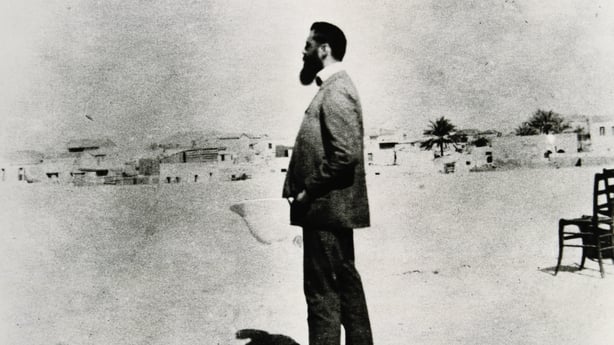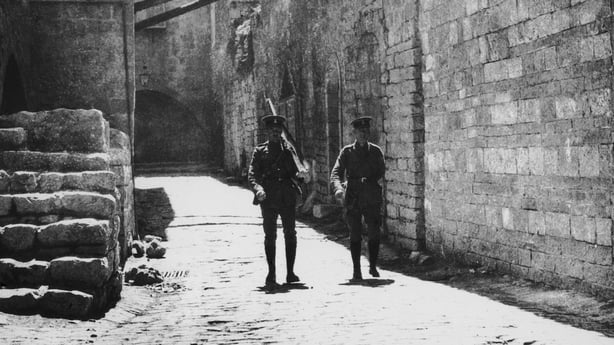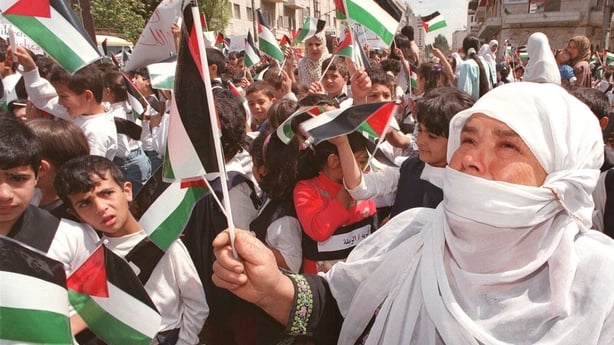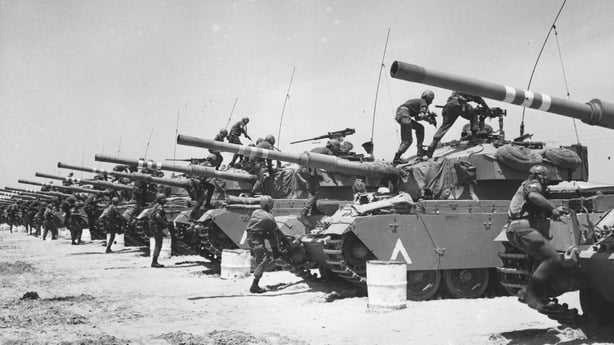People often describe the Israel-Palestine conflict as one that goes back decades.
Though it is now a modern territorial dispute - two nations, one land - the truth is that it has ancient origins.
During biblical times, Jewish people lived in the land that is now Israel and Palestine as part of two kingdoms - the Kingdom of Israel and the Kingdom of Judah.
That's why Jews call the region their ancestral homeland.
Over the next 1,000 years, Jews were expelled and exiled from the region in a number of conflicts and conquests, including by the Roman Empire.
Jews settled across the world, and many of them came to Europe, where they also faced persecution.
In 1896, Theodor Herzl, a Jewish journalist and political activist, published Der Judenstaat, or The Jewish State, in Vienna.
It envisioned the creation of an independent Jewish state in Palestine, and concluded that Europe did not offer much hope for Jewish people.
The following year, Mr Herzl convened the first Zionist Congress in Basel, Switzerland.

They agreed to establish a permanent organisation that would lobby for support for the cause in the ensuing decades.
The problem, however, was that Palestine was already inhabited, and a part of the Ottoman Empire.
And while the region was significant for Jews, Jerusalem was, and still is, one of the holiest cities for Muslims - the site of the Al Aqsa mosque compound, where the Islamic prophet Muhammad is thought to have ascended to heaven.
But, regardless of their religion, Palestinians also trace their roots to Palestine as their homeland. To them, it has always been their home.
The situation in the region changed significantly during the First World War.
In November 1917, in what is now known as the Balfour Declaration, the British government promised Jews that it would help facilitate a Jewish state in Palestine, a land where 90% of the population was Arab.
"His Majesty's Government view with favour the establishment in Palestine of a national home for the Jewish people, and will use their best endeavours to facilitate the achievement of this object," wrote Arthur Balfour, then the British Foreign Secretary, in a public letter to Walter Rothschild, a prominent Zionist leader.
By the end of the war, the British Army had occupied the Arab territories, creating a number of states, including Turkey, Lebanon, Syria, Iraq and Transjordan.
Just a few weeks after the Balfour Declaration, the British occupied Jerusalem, an occupation that gave rise to the state of Palestine.

It was a confluence of events that alarmed the Arabs.
In the ensuing decades, thousands of Jews moved to Palestine, where they purchased vast quantities of land.
They also established their own health, education and taxation systems in Palestine.
Though Palestinian Arabs were outraged, due to rivalries between the different factions of notables, they were also divided.
But, by 1936, ordinary Palestinian Arabs were sufficiently aggrieved to organise a general strike that lasted six months.
All those working in labour, transport and shopkeeping refused to work – prompting the Palestinian notables to come together to form the Arab Higher Committee.
The committee agreed to Britain's plan to appoint a commission to make recommendations on Palestine.
But, when the 1937 Peel Commission proposed the partition of Palestine into two states, Palestinian Arabs once again revolted against British authorities.
In the following decade, World War II prompted Jews to emigrate in even greater numbers to Palestine.
The Palestinians also rejected the UN's 1947 partition plan, which envisaged the creation of an Israeli state on 56% of the territory.
That did not stop Jews from proclaiming the establishment of the State of Israel in 1948.
Over 700,000 Palestinians were either expelled or fled in terror. In what is known as the Nakba, or catastrophe, they lost their homes, their land and their way of life.

By the end of two years of fighting in 1949, only 22% of what was British-occupied Palestine was left outside of Israel's borders - what became known as the West Bank, and Gaza.
Those internationally recognised borders stayed fixed until the Six-Day War in 1967, when Israeli forces captured and occupied Gaza and the West Bank.
And that is precisely why it is referred to as the occupied West Bank - and it's exactly why many countries, including Ireland, call for a return to the pre-1967 borders.
While Israel technically withdrew from Gaza in 2005, since then it has enforced a strict and suffocating land, air and sea blockade - leading to horrendous living conditions and high levels of unemployment.
In the meantime, the peace process has remained moribund in the decades since a set of agreements known as the Oslo Accords, which were signed in the mid-1990s.
They established the Palestinian Authority, which has facilitated some level of self-governance in the West Bank.
But, in Gaza, the authority was forced out in favour of Hamas, the Islamic fundamentalist militant group that controls the pocket of land.
Despite international concern, Israel has conducted military raids and expanded Jewish settlements in the West Bank, particularly in areas that are considered biblically significant.

And despite occasional conflicts and rocket fire from Palestinian territories, the strength of the Israeli military has ensured that the overwhelming majority of the deaths in recent decades have been Palestinian.
Under Israel's far-right and ultranationalist government, which came into office last December, settlement building in the West Bank has increased significantly.
And major assaults on refugee camps in the West Bank, ostensibly to target Palestinian militants, have also picked up pace.
Israeli raids on the Al Aqsa Mosque in Jerusalem, the third-holiest site in Islam, have also inflamed tensions.
In recent years, many Palestinians have come to accept the idea of two states - the so-called two-state solution. But there is no longer any agreement about what that would mean.
And things are once again impeded by divisions on the Palestinian side: in the West Bank, controlled by the Palestinian Authority, younger people have lost faith in efforts to end the conflict with negotiations and diplomacy.
Mahmoud Abbas, the 87-year-old who leads the authority, is seen by many as yesterday's man, not least because elections have not been held in Palestinian territory since 2006.
That is even more true in Gaza, which is controlled by Hamas. The militant group does not recognise Israel's right to exist - and instead believes that all Jews should be driven out of the region.





